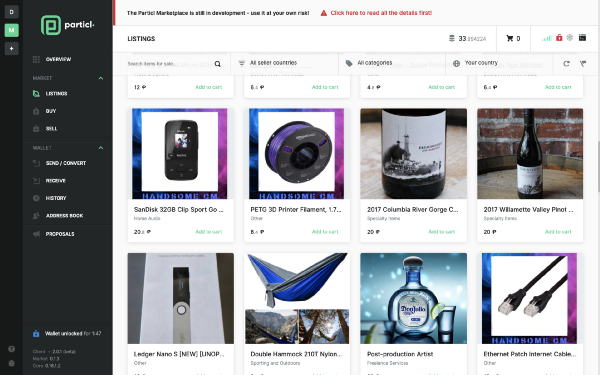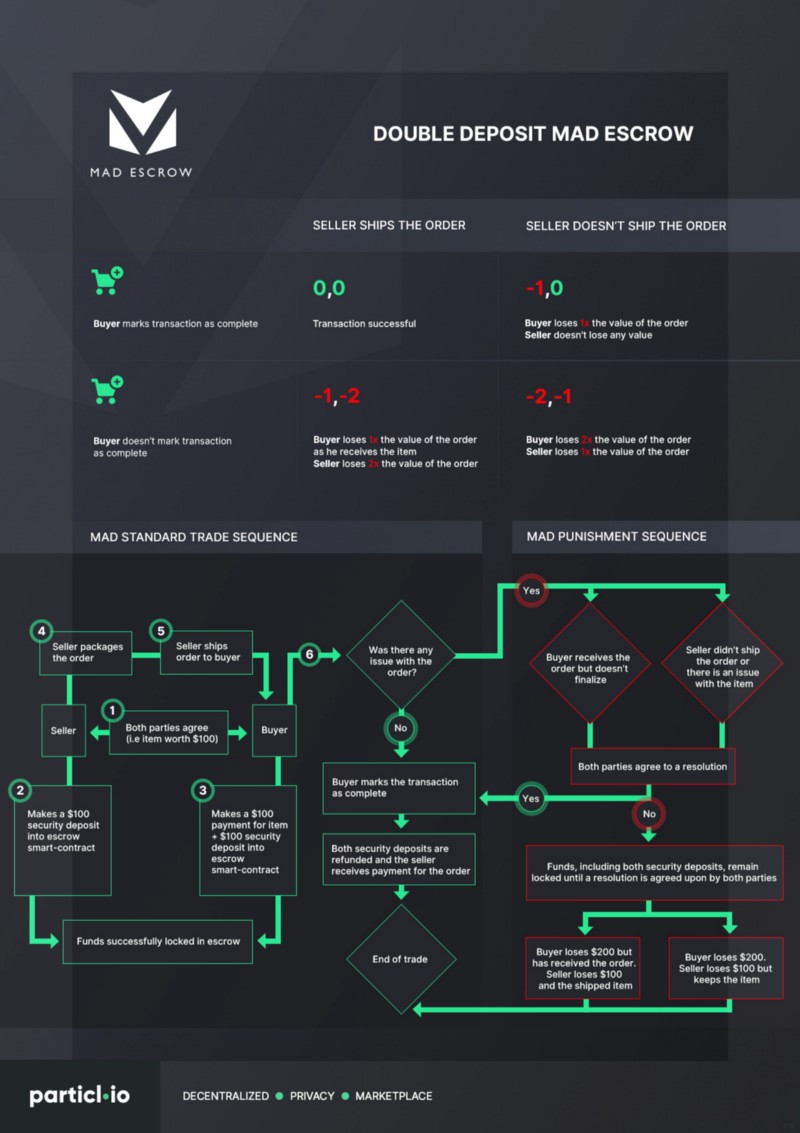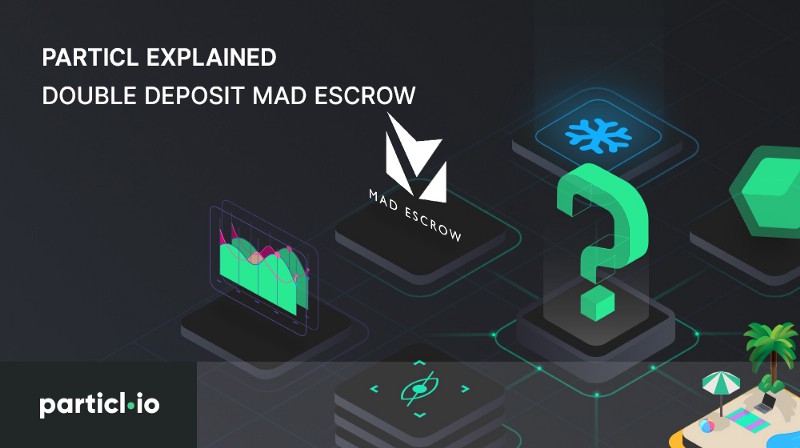
Free of Use and Free of Any Intermediary
Particl is an entirely decentralized platform. There is no third-party or intermediary operating it, running servers, or having any sort of special control over its network. Instead, it uses a mix of P2P and blockchain technologies, meaning that it is exclusively run by its global community of users that are running nodes. It is, in most ways, pretty similar to how P2P torrent networks operate and is the reason why they can’t be censored.

The Open Marketplace is an equally decentralized application that’s built on top of the Particl network. It allows anyone in the world to securely buy and sell goods and services, physical or digital, regardless of where they are located in the world. The marketplace requires no sign-up, no personal information, no subscription, and is free of use. And because it is entirely decentralized, there’s no staff or support team to manage disputes between a buyer and a seller. But that doesn’t mean there is no system to keep both parties honest in place.
Furthermore, the Open Marketplace is completely private by default, meaning no identifiable data can be linked to any of its users. Transactions are hidden on the blockchain, images are stripped of their metadata, data exchange and communications are encrypted, and you can even connect the marketplace through the Tor network. In other words, users of the marketplace are as anonymous as the current privacy technologies of today allow you to be.
Trusting the Other Party
However, the combination of all the marketplace’s characteristics mentioned above introduces a bit of an issue when it comes to trusting the other party (whether that be the buyer or the seller) when making a transaction on the marketplace.
On traditional, centralized marketplaces, this isn’t the biggest of deals, at least from the customer point of view. In fact, these platforms either have a “resolution center” in place or an escrow system where users can be assured that the other party will behave honestly. And it works…in most cases.
Particl, however, is entirely decentralized and private. That means there’s no staff around to arbitrate issues and make sure all transacting parties are honest between each other.
So then, how can you prevent the other party from not respecting their end of the deal when their identity is private and when there is no central party that can punish bad actors? Does the buyer send the payment first, and then hope his product arrives in a good shape, if at all? Or does the seller take the risk to ship the item before receiving the payment? This all boils down to trust, and trusting strangers on the web, especially when they use bleeding-edge privacy technologies, has always proven to be risky and, frankly, ill-advised.
That’s where Particl’s innovative dual deposit MAD escrow system comes into play.
Dual Deposit MAD Escrow System
Like most marketplaces, Particl uses an escrow system to keep transacting parties honest. The major difference between Particl’s escrow system and the system used in traditional marketplaces, however, is the fact that it’s completely trustless, meaning you do not need to trust any party or intermediary to have the assurance that a marketplace transaction won’t turn sour. It’s also free of use, private-by-default, and fully autonomous between the buyer and the seller.
An escrow that doesn’t require any staff to operate is groundbreaking. For one, it dramatically increases the privacy of all participants by ensuring that all transaction details, account information, tracking numbers, conversations, and any other kind of exchanged data, stay private and only known by the two transacting parties (the buyer and the seller). It also means there’s no outside party looking to charge you fees for their services because there are no services being offered to you by any intermediary (which would usually be the escrow agent or user support staff). Additionally, it heavily reduces friction and makes the escrow as scalable as the network itself can be. No need to keep hiring more staff as the platform grows, and no need to worry about moderators’ schedules and availabilities unlike other decentralized marketplaces (i.e. OpenBazaar’s 3-of-2 escrow system, for example).
So how exactly is this even possible? How can two parties be honest with one another without any third-party enforcing honesty?
Dual Deposits

In order to prevent any of the two transacting parties from behaving dishonestly, there usually needs to be a punishment or disincentive in place. Typically, on traditional marketplaces, this punishment will usually be the moderator ruling against the faulty party, although that, too, can be skewed and screw one of the parties unfairly (hint: eCommerce platforms will almost always rule in the favor of the buyer, not the seller).
On Particl’s Open Marketplace, that punishment/disincentive comes in the forms of dual deposits and game-theory.
The way Particl’s escrow system functions are simple, but it’s also pretty effective. In a nutshell, when making a marketplace transaction, both parties (the buyer and the seller) need to match, as a security deposit into an escrow smart-contract, the value of the item being purchased by the buyer plus the shipping costs. This ensures both the buyer and the seller have equal skin in the game. Then, once both parties confirm that the transaction has been completed satisfactorily, the security deposits are refunded back to each party, at no fee other than the regular cryptocurrency transaction fee.
To visualize this, let’s take the example of a customer purchasing an item worth $100 with $10 shipping costs. That buyer is going to put $220 in escrow — $110 which is the payment of the item being purchased, including shipping costs, and another $110 which is the security deposit that’s going to be refunded, in full and without any fee, at the end of the transaction. The seller, on the other hand, has to also match the security deposit of the buyer, meaning he will be funding the escrow smart-contract with $110. And since the seller will be shipping an item worth $110 through the mail, shipping fee included, it means both parties now have $220 on the line.
While the funds of both parties are locked up in escrow, the seller is going to package and ship the order. Then, once the buyer receives the package, he’s going to assess that no foul play has been involved, and then mark the transaction as complete once satisfied about the transaction. Marking the transaction as complete will refund the two security deposits, in full, to both parties.
Mutually Assured Destruction (MAD) Game-Theory

The reason why this works is simple, if either one of the two parties misbehaves or tries to screw the other party over, the other party isn’t going to mark the transaction as complete, which essentially makes the other party’s security deposit inaccessible. The only way for the other party to get his security deposit back is to reach an agreement in such a way that both users will be satisfied. Only then, will the unsatisfied party, now satisfied due to the agreed-upon resolution, mark the transaction as complete.
This dynamic is often referred to as Mutually Assured Destruction (MAD). It is a well-known war doctrine based on game-theory. The theory stipulates that if two countries are in possession of nuclear weapons, they won’t use them against each other. The reason for that is pretty simple — if one country launches a nuke towards the other party, it is almost guaranteed that the other country will retaliate and launch a nuke as well. The end scenario is that both countries will essentially annihilate each other with highly damaging weapons. In other words, both countries lose and get turned into dust, hence why this game-theory is called Mutually Assured Destruction.
The effectiveness of that game-theory was on full display, in a real-world scenario, during the Cold War when both the US and Russia heavily threatened each other with nuclear warheads. Missiles were very visibly targeted at each rival country, but never was a nuclear attack initiated due to the fear of retaliation from the other country.
How Does That Theory Tie In With Particl’s Escrow System?
Particl’s escrow is more of the same, only the game-theory doesn’t revolve around the use of nukes, but around financial losses. The important point to understand here is that the entire MAD game-theory revolves around the fact that if one party misbehaves, it has to be punishing for both parties involved, hence the “Mutually Assured Destruction (MAD)” part of the game-theory. With Particl, that negative incentive is a net financial loss.
In fact, if both parties cannot agree on an outcome, they both won’t receive their security deposits back, incurring a net loss for everyone involved. That’s precisely the reason why this game-theory forces parties to actively work towards reaching an agreement on their own, without requiring any sort of intermediary to arbitrate the situation. If they don’t, they both lose funds, and no one wants that to happen. If they do reach an agreement, then they can successfully complete a marketplace transaction without paying fees (except for the usual cryptocurrency transaction fee) and without forfeiting any personal or business-related data to any outside party or intermediary.
This model of escrow is not only empowering, but it’s also a safe bet that no outside party will have access to any of the information being exchanged between the two transacting parties. This is a game-changer, especially for supply chains and sensitive business to business deals where none of the party involved wants a third-party to snoop in. There’s no account details being revealed to an escrow agent, no transaction history being looked at, no tracking number or shipping address being looked at, no conversation being logged, and so on. Equally as important, there’s also nothing traceable or identifiable being publicly written on the blockchain.
Privacy
Probably the most powerful feature of this entire escrow mechanism is the fact that all currency transactions are initiated using the powerful RingCT privacy protocol. The escrow smart-contract itself works using the Confidential Transactions (CT) privacy protocol, but any incoming and outgoing transactions to it are done with RingCT. Check out this Particl Explained — Private Transactions article for more details about how CT and RingCT transactions can be linked together.
Particl Explained - Private Transactions
Anonymous transactions, or Anon transactions, as referred to in Particl Desktop, take privacy to the next level by not…particl.news
And because all transactions that occur on the marketplace have to go through the escrow system, it means they’re all untraceable by design.
This ensures all marketplace transactions are fungible and as private as the next one. It’s also a great way to grow the pool of private transactions (the number of RingCT outputs) that occur on the network, something that greatly enhances the quality of the privacy of the whole platform.
Interested in learning more about Particl, its platform, and its marketplace? Make sure to keep an eye close to Particl.news for regular news, updates, and similar educational material. More specifically, watch out for more Particl Explained articles coming out soon and make sure to read the previous ones!

Particl is Participation
Get recognized as someone that cares. With your help, we become more noticed out there. It takes seconds, and you are making a statement by giving us a follow and hitting the bell icon.
YouTube Twitter Mastodon Reddit
Join the instant messaging chats. There's no need to be active, but it’s good to be in the loop.
Discord Telegram Element / Matrix
Gain deep knowledge about Particl by reading.
Last but not least, a list that shows an infinite number of links clearly categorized and on one page.